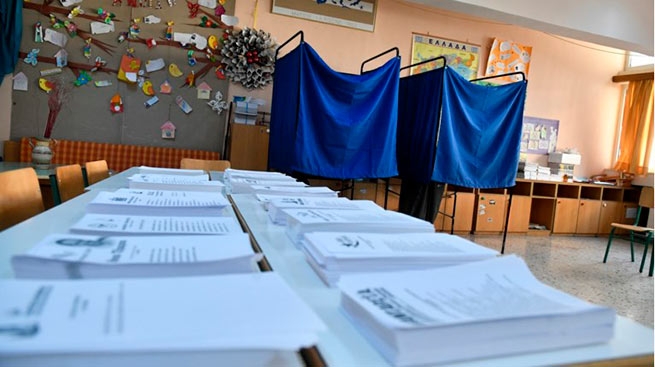With a month left until the May 21 elections, the state apparatus is now in the final stages of preparation, and in this publication you will find everything you need to know about the procedures and procedures for the 2023 Greek parliamentary elections.
1. Elections on May 21, 2023 will be held under the system of “simple proportional representation”.
When changing the electoral legislation, of course, several new facts are introduced that no one was previously familiar with.
The first in a series of laws that will apply in the upcoming elections is absolute proportional representation for parties with 3% or more. Thus, in practice, in order to have a majority of votes, namely 151 seats in parliament, it is required not only to receive more than 50% of the votes, but also a lower percentage, depending on unrepresented votes.
According to the current electoral law, in order for a party to receive seats in parliament, it must receive at least 3% of the vote. If by-elections are necessary, they are held according to the electoral system provided for by the Law on the Electoral System No. 46/54/2020, which is a type of extended proportional representation with a bonus of up to 50 seats in favor of the party with the largest number of votes.
This particular electoral law on simple proportional representation was passed in 2016 at the initiative of the then “Syriza” government. Its main feature is that it virtually bans one-party majorities, but this does not mean that the party with the most votes can be easily ignored in the formation of the government, especially if it leads by a significant margin.
Recall that tomorrow (April 22) the election season officially begins in the country, this will happen when Prime Minister Kyriakos Mitsotakis visits the President of the Republic, Katerina Sakellaropoulou, to ask her to dissolve parliament and call parliamentary elections.
2. 17 year olds got the right to vote
An important issue is how young people aged 17-19, who vote for the first time and make up about 4% of the electorate, will vote in the elections. The number of 17-year-olds is estimated at 112,097 and the question is who they will vote for. In Greece, they first received the right to vote. The corresponding law was adopted in July 2016 by the Greek Parliament, with a majority of 180 deputies in favor of voting from the age of 17.
3. Greeks permanently residing abroad will get the right to vote for the first time
In these national elections, Greeks living abroad will for the first time be able to vote in their place of residence. The votes of voters who have exercised their right to vote at the polling stations will be equally counted in the overall result of the election and, therefore, in the distribution of seats throughout the country.
The number of state deputies is increased from 12 to 15. Voters in constituencies abroad will choose (without putting an end to preferences) the parties of their choice. The choice of one or more candidates for the state ballot from the diaspora is left to the parties. Voters who collectively meet the following criteriahave the right to be registered in the lists of voters abroad:
- During the last thirty-five (35) years they have been permanently resident in Greece for at least two (2) years.
- They filed a tax return (E1 or E2 or E3 or E9) either in the current or previous tax year.
4. What are the changes in the electoral system for municipalities
At the same time, changes in the procedure for electing presidents and councils in municipal communities were made by the repeated law of the Ministry of the Interior, adopted on Tuesday and published in the Official Gazette under number n. 5043/2023 titled “Local Government Regulations of the First and Second Degrees; Companion Animal Welfare Regulations; Public Sector Human Resources Regulations; Other Department of the Interior Regulations and Other Urgent Regulations“.
In particular, Article 18 provides that, starting from the next municipal elections, municipal communities with a permanent population of 201 or more will have a council of three members. This currently applies to municipalities with more than 300 inhabitants. In total, there are 723 municipal communities with a population of 201 to 300 inhabitants that are covered by this provision.
According to the new regulation:
Municipal communities with a population of up to 200 inhabitants are governed by the chairman of the municipal community, and with a population of more than 201 inhabitants – by the chairman of the council of the municipal community and the council of the municipal community.
The council of the municipal community consists of:
- three members – in municipal communities with a population of 201 to 2000 inhabitants,
- five members – in municipal communities with a population of 2,001 to 10,001 inhabitants,
- 11 members in municipalities with a population of 10,001 to 50,000 inhabitants,
- 15 members in municipalities with a population of 50,001 or more.
It should be noted that councils of municipal communities not elected in the municipalities of the region of Atticawith the exception of the municipalities of the regional units of the islands of East and West Attica.
The first candidate of the combination that scored in the first round in the municipal community an absolute or relative majority of all valid ballots is elected President of the municipal community. The remaining candidates of the same combination, in descending order of the received crosses, are considered substitutes.
According to Article 37, the chairman of a municipal community with a population of up to 300 inhabitants and councils of municipal communities with a population of 301 to 2,000 inhabitants will be elected according to the results of elections in that particular municipal community, regardless of whether they are in the group of the winning mayor or not. The seats of councilors are distributed in proportion to the groups that took part in the elections in a given municipality and in accordance with the number of valid ballots received in that municipality. The chairman of the three-member council is the councilor of the first combination in the municipality with the highest number of votes.
In municipal communities with a population of 2001 inhabitants or more, in which five-, eleven- and fifteen-member councils are formed (depending on the permanent population of each municipal community), the first councilor from the combination of the mayor is appointed chairman, since in accordance with the law the combination of the mayor receives 3 /5 Council of these municipal communities.
Article 10 contains a special provision on the election of the chairman of the council of a municipality with a population of more than 300 inhabitants, valid until December 31, 2023, when the current term of office of the municipality expires. This provision is in line with the decision of the plenum of the State Council, which recognized as unconstitutional the provisions on the procedure for electing the chairman of municipal communities with a population of more than 300 inhabitants by appointing a member of the council of the first combination in turn. The new provision reinstates the provisions providing for the election of the president of the municipality by all members of the council between the first two councilors of the first two combinations in the order of election.
This means that in those municipalities with a population of more than 300 where the chairman was not elected in a combination that received more than 50% of the votes, a special meeting of the municipal council would have to be held to re-elect the chairman.
5. Where to vote
Citizens who want to know where to vote in electionscan visit the platform of the Ministry of the Interior “Find out where to vote.”
On the Find out where to vote platform, you will need to complete:
- or your personal data (last name, first name, father’s and mother’s names, year of birth),
- or just the fields for your special electoral number and your last name.
On the site https://www.ypes.gr/mathe-poy-psifizeis-forma/ you can see where you vote without codes and passwords.
6. Updated Voter Lists for Non-Resident Voters
The registries now include those non-resident voters (persons residing in a place other than the registered one) who applied before February 28, 2023.
The registry was last updated on April 11, 2023 with changes until 02/28/2023. Those voters who applied to transfer on or after March 1 will have to move to the precinct to which they were eligible, as they were not included in the changes.
It should be noted that withdraw the applicationthat is, it is no longer possible to be excluded from special electoral lists.







More Stories
Life on wheels
Zombie cells that cause aging: scientists are looking for a way to destroy them
Found a wild bear cub "shelter" in the backyard of a residential building